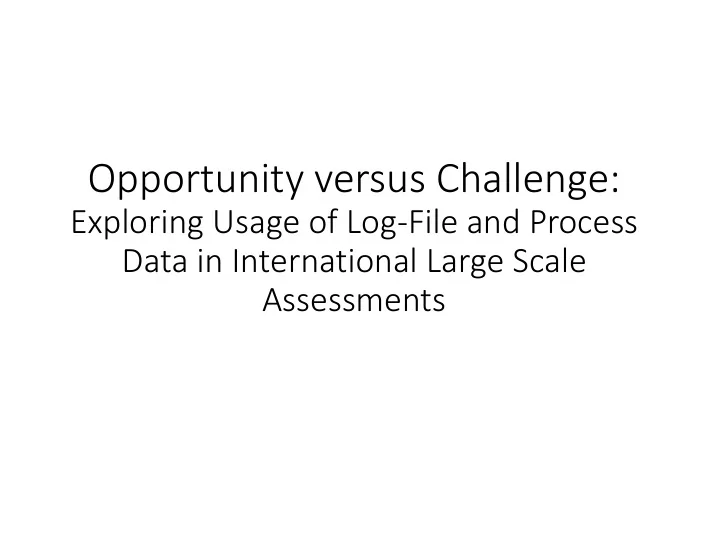

Opportunity versus Challenge: Exploring Usage of Log-File and Process Data in International Large Scale Assessments
Retrospective Points 1. Items we are analyzing to mine process data were not written to support process data analysis, which complicates efforts to do. 2. If we are to have process data to test hypotheses, items need to be set up to capture appropriate processes. 2
If we are to have process data to test hypotheses, items need to be set up to capture appropriate steps. 3
Visualization of NAEP reading patterns from sampled logfiles Each sampled student represented by a blue dot. Pages of text represented by “roofs” indicating which page being looked at. Ten test questions represented by “buckets”
Retrospective Points 1. Items we are analyzing to mine process data were not written to support process data analysis, which complicates efforts to do. 2. If we are to have process data to test hypotheses, items need to be set up to capture appropriate processes. 3. “Time on task” is complicated to use as a variable (and total time needs to be distinguished from time on specific processes) 5
Time on task Loris: Measure of effort – proxy indicator developed from time data. Britt (Quiwe): Time on task can be generalized and abstracted from PSTRE items but no difference between time spent on task leading to a correct answer and those leading to a wrong answer. Reinaldo: Can’t discriminate success and failure based on time Kentaro: Response time data interact with 1. Student proficiency/skills 2. Assessment domain 3. Language of assessment 4. Cognitive demand of items (e.g., low skilled will read at the same speed but high skilled readers will take more time reading on harder items) 6
Retrospective Points 4. Process data allow us to move beyond simple correct/incorrect. 5. Distinguishing between different types of “correct” and “incorrect” responses (based on how achieved/how failed) provides valuable insight on student performance. 6. Important to distinguish between “information generation” (taking correct steps to arrive at the correct conclusions) and “information interpretation” (translating conclusions into the correct response). 7
Research into understanding respondent behaviors and cognitive strategies Luis and Frank: research to improve teaching and learning with specific information on how different students think/perform Sam, Britt, and Reinaldo: research to better understand factors that distinguish high- and low-performers, or expert from novice strategies Loris: research to better understand the relationship of motivation and performance.
Research into understanding respondent behaviors and cognitive strategies 9
Retrospective Points 7. Iterative feedback loop essential between design and analysis to improve quality of process data and research 10
How can there be a feedback loop? 11
Retrospective Points 7. Iterative feedback loop essential between design and analysis to improve quality of process data and research 8. Not clear how large-scale assessment systems can be modified to incorporate feedback 12
Inappropriate uses of process data For example, • Overgeneralizing from one item to all items, or one process to many processes • Concluding that strategies associated with higher performance are the strategies that all students should be taught • Making classroom and formative assessments turn on process data in such a way that students lose unstructured opportunities to try out new ways of thinking and doing • Ethically questionable uses of student responses and identification of students
Purpose of assessments • Who can get the answer correct – sorting function • Where do students go wrong? – pedagogical function to improve teaching • How do humans learn? – research function • What is nature of knowledge, thinking, and understanding? – philosophical question 14
Main takeaway Ultimately process data are a proxy for cognitive processes 15
Recommend
More recommend